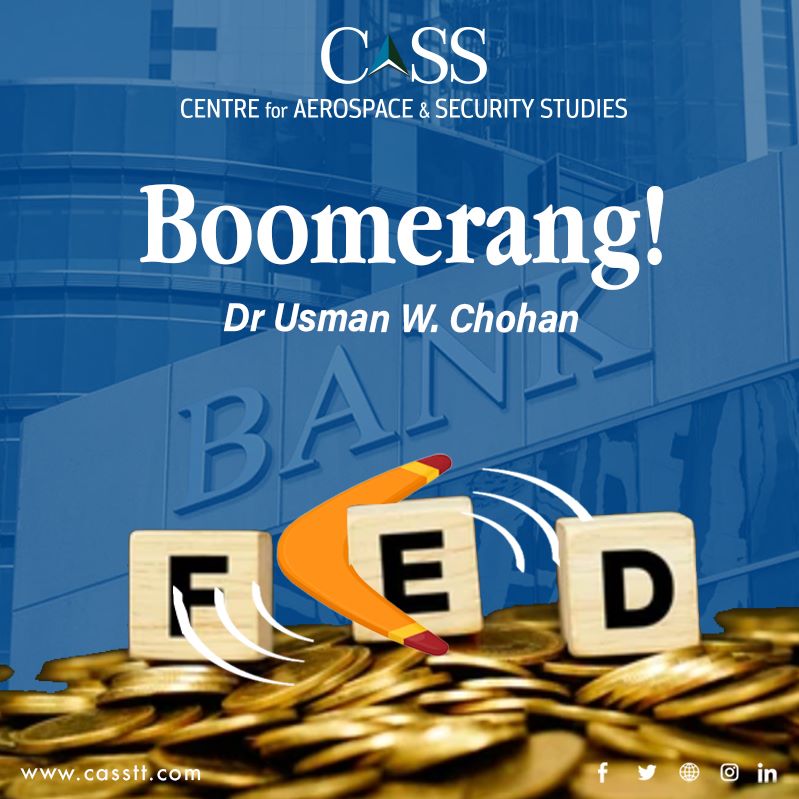The manner in which the policies of the US central bank (Fed) have decimated the global economy over the past year is not just evident from the developing economies that have been destroyed (Sri Lanka, Lebanon) or paralyzed (Pakistan, Peru), but also in the damage to the American economy itself, which is best exemplified by the collapse of three separate banks during March 2023, and perhaps more to come. So it is no longer a question of what the Fed is doing to Third World countries on distant shores, but of how Fed policies have swiftly boomeranged to unbalance the American financial system itself.
Three American banks and a fourth one in Switzerland fell in quick succession because of the Fed’s misjudged and hard-swinging monetary contraction in 2022, with interest rates going from near 0% to almost 6% in less than a year. The first domino to fall was Silicon Valley Bank (SVB), which lost its bearings due to the panic generated by its duration mismatch. Since it had invested in old bonds that paid low interest rates, new bond issuances at high rates became much more attractive and sank the value of its existing bond holdings, leading scared depositors to pull out as rumors spread of its unbalanced fixed income exposure.
The second bank to tumble was Signature Bank, which fell because of similar concerns, while a third bank named Silvergate was also affected by all this as well as by its undue exposure to cryptocurrencies, which fell along with traditional asset classes (like equities) after the Fed raised rates and money went into treasuries. A fourth Swiss bank, the giant Credit Suisse, collapsed as contagion and fear spread beyond the US, and the latent problems of the bank came into the spotlight, forcing Swiss authorities to impose its acquisition by another bank.
Looking at these bank failures in a local context belies, however, the global problem caused by the Fed, which must be viewed in the big picture where it pertains to both the toxic-asset problem in the American economy and its crony capitalism that is held behind a very thin veneer. After two decades of excessively loose monetary policy in the period 1990-2007 (the Greenspan era), for which the Fed received generous praise from the Wall Street crowd, things came to an abrupt halt in 2008, when the subprime mortgage problem grew too large due to Wall Street corruption.
The Fed at the time injected a massive dose of morphine into the system through quantitative easing (monetary stimulus), which patched up the problem for a while, but it did not address the roots of economic dysfunction in America: financial lobbying, a revolving door between Washington and Wall Street, and growing inequality due to underinvestment in the public good. But the Fed was enjoying the accolades, and the man who spearheaded the 2008 rescue stimulus even received the Nobel Prize in Economics (Ben Bernanke). It therefore didn’t tighten monetary conditions because the ride was too good, and because American elites did not want to face up to the actual erosion within the underbelly of the economy.
When the Covid-19 pandemic hit in 2020, therefore, the Fed was still too happy enjoying the buzz of the 2008 morphine, and administered yet another dose of morphine ten times larger than the previous one. If it hadn’t done so, the Fed argued, the economy would have faced more devastation than any war might have unleashed (as former Fed chairman Yellen has warned). The bigger 2020 morphine dose of quantitative easing was also, however, a mere sedative that did nothing to remedy the structural issues that had festered in the American economy. In fact, much of the stimulus went to large corporations rather than to desperate households!
It was an elite nomenklatura that captured too much of the stimulus, with trinkets thrown (the $600 stimulus cheques) at the public. The trinkets themselves did not necessarily go into the right end uses either, and much cash flowed through retail investments in stocks, cryptocurrencies, a new housing market bubble, NFTs (a whimsical digital asset), and other eccentric collectibles. The American stock market was up, even as the economy was down. As such, two massive morphine doses over 15 years, and the Fed somehow thought the withdrawal systems would be mild. “Transitory inflation,” it said in 2021, not realizing that all this morphine was going to need flushing out of the poisoned veins of American capitalism.
When the Fed realized how off-the-mark it was, inflation had already taken a galloping speed post-Covid. The Fed thus reacted with equally irresponsible timing by shooting up interest rates at the fastest rate in history (2022). This led to massive reverberations throughout the American economy, with the stock market, housing market, cryptocurrency market, and just about all markets collapsing simultaneously in 2022. In 2023, it also led to devastation in the American banking system, including the collapse of SVB and Signature ban. A great deal of fictional wealth was eroded in a brief time span, as shock therapy was being applied to the morphine addict. The worst affected, however, were the developing countries, which witnessed massive capital outflows (Egypt being a strong case in point), along with fiscal imbalances, political instability, and commodity shortfalls.Yet one now sees the boomerang returning from the developing world back to the United States.
Over the past year, American economic pundits were largely unmoved as a large swathe of developing countries were being devastated by the monumental incompetence of the US Fed. In Karmic retribution, it is now of immediate concern to the very same authorities, and the Fed may have to reverse course at a time when its already low credibility is hinging on the continuity of its interest rate hikes to anchor market expectations. Now those pundits can worry about something closer to home.
Dr. Usman W. Chohan is Advisor (Economic Affairs and National Development) at the Centre for Aerospace & Security Studies, Islamabad, Pakistan. He can be reached at cass.thinkers@casstt.com.




